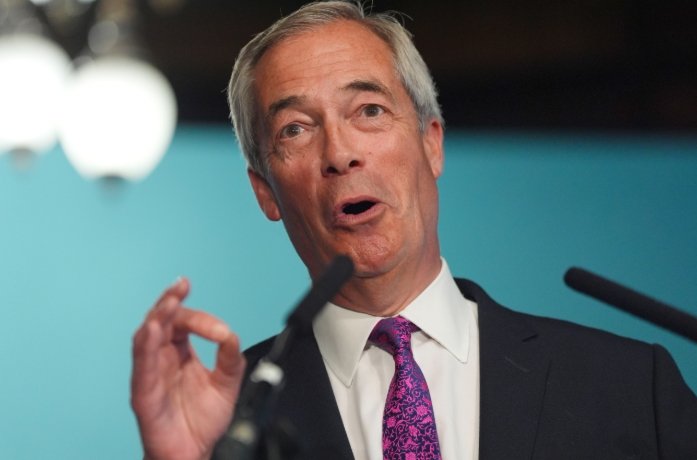The Hamilton, Larkhall and Stonehouse by-election has erupted into a political flashpoint following Reform UK leader Nigel Farage’s campaign visit to Scotland, triggering a unified backlash from rival parties amid accusations of racism, media manipulation, and populist provocation.
Farage’s arrival in the bellwether central belt seat—his first appearance in Scotland during this campaign—saw him position Reform UK as a disruptive force aiming to “eclipse Labour” and challenge the political dominance of both the SNP and Scottish Labour in an increasingly volatile electoral landscape.
The by-election, set for Thursday, was called after the death of long-serving SNP MSP Christina McKelvie. While the contest was initially expected to be a three-way fight between the SNP, Labour, and the Conservatives, Reform UK has used the campaign to assert itself as an insurgent force targeting working-class discontent.
Farage’s Visit Draws Immediate Political Fire
Speaking first in Aberdeen and then campaigning through Larkhall and Hamilton, Farage claimed Reform was “a fresh, positive voice” in contrast to what he described as the “SNP-Labour seesaw” of Scottish politics.
Reform’s growing footprint in Scotland was marked by the defection of two councillors—Duncan Massey, formerly a Conservative on Aberdeen City Council, and Jamie McGuire, who previously represented Labour on Renfrewshire Council. Farage presented the defections as evidence that Reform was “attracting very, very good fresh talent.”
However, the reaction from Scotland’s political establishment was swift and severe.

Sarwar: “The Reform Circus Is in Town”
Scottish Labour leader Anas Sarwar, campaigning alongside Labour candidate Davy Russell in Larkhall, launched a direct attack on Farage’s presence, accusing him of stoking division and offering “no real solutions” to local challenges.
“The Reform circus is going to come into town with Nigel Farage as the chief clown and then move away,” Sarwar said. “But it’s not going to improve people’s lives here in Hamilton, Larkhall and Stonehouse.”
Sarwar added that Farage “doesn’t care about Scotland” and urged voters to reject “the poison of Reform” while also condemning the SNP’s record on the economy and public services. Labour’s campaign messaging has focused on portraying Russell as the only candidate capable of delivering practical change.
Farage has refused to apologise for a Reform UK advert that targeted Sarwar, selectively quoting a 2022 speech he gave during a celebration of Pakistan’s independence. Reform inserted text in the video suggesting Sarwar sought to “prioritise the Pakistani community”—a claim not substantiated by the speech itself.
Both Sarwar and First Minister John Swinney denounced the ad as “blatantly racist.”
Farage rejected the accusations, insisting, “We don’t talk about race at all,” and doubled down by calling Sarwar’s speech “sectarian in its very nature.”
SNP Frames Farage as Existential Threat
Campaigning alongside SNP candidate Katy Loudon, First Minister John Swinney condemned Farage as “the opposite of everything I believe to be important in society today.”
Speaking during a visit to a children’s charity in Hamilton, Swinney described Farage as the architect of Brexit and an advocate for NHS privatisation.
“People in Hamilton, Larkhall and Stonehouse have got to realise that if they want to stop Farage, they’ve got to vote for the SNP—who are the only alternative to Farage that can win,” Swinney said.
The SNP’s framing of the by-election has shifted markedly in recent days, from a focus on Labour’s threat to a defensive posture against Reform UK’s possible upset. Party insiders admit privately that dissatisfaction with the Scottish Government’s handling of healthcare, education and transport may drive traditional SNP voters toward Reform or abstention.
Tories, Greens, and Lib Dems Join Chorus
The Scottish Conservatives also denounced Farage, but found themselves on the defensive after losing a sitting councillor to Reform. MSP Douglas Lumsden called Duncan Massey’s defection “really disappointing” but acknowledged that his party faces “a difficult fight” in the constituency.
Scottish Conservative leader Russell Findlay warned that Reform UK’s proposals to revisit the Barnett Formula amounted to taking “a wrecking ball to Scotland’s public services.”
Meanwhile, the Scottish Greens turned their fire on Reform’s pro-fossil fuel stance, accusing the party of “courting donations” from oil and gas companies. Co-leader Patrick Harvie blasted Farage’s climate policies as “a carte blanche to fossil fuel giants in the North Sea and across Scotland.”
The Liberal Democrats criticised Farage for engaging in what they called “Trumpian” attacks on the media after the Reform leader accused The Herald of working with demonstrators to sabotage his press event in Aberdeen.
Christine Jardine MP, Scottish Affairs spokesperson for the party, said Farage’s rhetoric was “dangerous and unserious.”
“Before you know it, he’ll be banging on about building a wall and chanting ‘lock her up’ to cover for his complete lack of actual solutions,” she said.
Street Tensions and Media No-Shows
Farage skipped a planned media appearance in Hamilton after demonstrators gathered outside the local Reform UK office. The tension on the ground reflects the polarising effect of Farage’s campaign tactics in Scotland—a country where he remains deeply unpopular among large swathes of the electorate.
Despite being booed and heckled on past visits north of the border, Farage has framed Reform’s push into Scottish politics as part of a wider effort to break what he calls the “cosy cartel” of mainstream parties.
Whether this message will resonate in a constituency with a strong SNP legacy and a resurgent Labour presence remains to be seen—but with the campaign entering its final stretch, Thursday’s result may offer a sharp test of whether Scotland’s political mood is shifting once more.


















